Aluminum Plate for Tanker Body
Alloy: 5052/5083/5454/5182/5059 Safe Transport, Leak-Proof
The choice of Aluminum Plate for Tanker Body depends on a variety of factors including cargo type, regulatory requirements, and specific application needs. The properties of the Aluminum Sheet make it ideal for many tanker hull applications, offering a combination of lightweight construction, corrosion resistance, strength, and versatility.
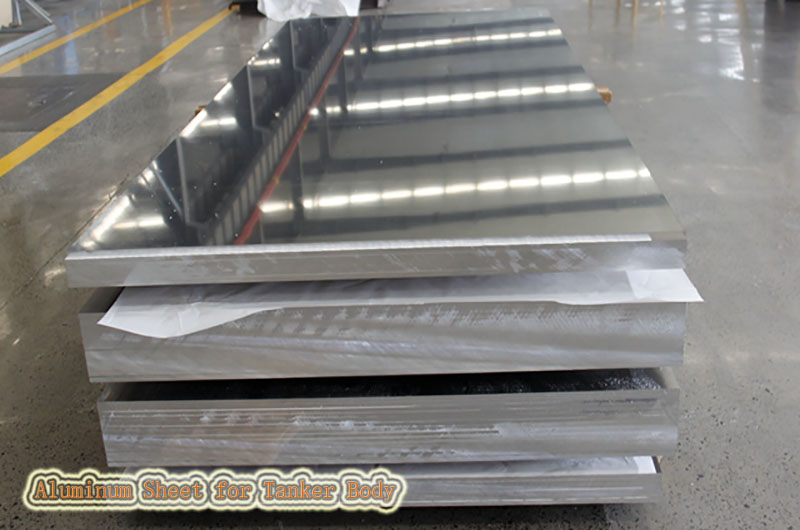
Aluminum Plate for Tanker Body Advantages
-
Lightweight
Aluminum is much lighter than other commonly used materials for Tanker Bodies such as steel. This weight advantage allows for increased payload capacity, reduced fuel consumption, and lower transportation costs.
-
Corrosion Resistance
Aluminum has excellent corrosion resistance, especially when exposed to various chemicals and liquids. This corrosion resistance is critical in Tanker applications where the cargo being transported may be corrosive or reactive.
-
Strength and Durability
The aluminum alloys used for the Tanker Body, such as 5052, 5083, and 5454, have an excellent strength-to-weight ratio. They provide sufficient structural integrity and durability to withstand the stresses and loads encountered during transportation.
-
Formability
Aluminum is highly formable and can be manufactured into the complex shapes and designs needed for the Tanker Body. This formability helps build tanks with tight tolerances, ensuring safe and leak-proof containers.
-
Weldability
Aluminum is easily weldable for efficient assembly and construction of tanker hulls. The welding process can be accomplished by a variety of techniques, ensuring proper sealing and integrity of the tank structure.
-
Thermal Conductivity
Aluminum has good thermal conductivity and can effectively dissipate heat from the tank. This property is especially important when transporting temperature-sensitive goods such as food or chemicals.
-
Recyclability
Aluminum is a highly recyclable material, in line with sustainability efforts and reducing environmental impact. The ability to recycle aluminum helps conserve resources and reduce energy consumption compared to making new materials.
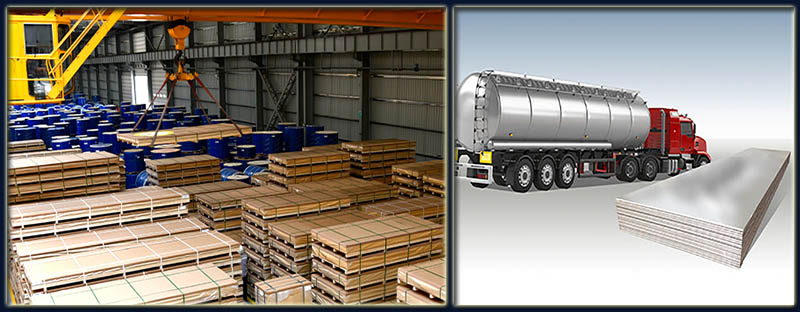
Aluminum Plate for Tanker Body Specifications
Aluminum sheet specifications for tanker hull structures can vary depending on industry-specific requirements and regulations. However, here are some common specifications to consider when selecting aluminum panels for tank truck bodies:
Aluminum Alloys for Tanker Body
5052, 5083, and 5454. These alloys provide a balance of strength, corrosion resistance, and formability for tanker applications.
Aluminum Plate Thickness for Tanker Body
The thickness of the aluminum plate will depend on factors such as tank size, cargo being transported, and regulatory requirements. Typical thicknesses for tank truck body panels range from 3 mm (0.118 in) to 6 mm (0.236 in) or more, depending on the application.
Temper
Aluminum plate is available in various tempers, such as H32 or H321, which provide different levels of strength and workability. The temper selected will depend on the specific requirements of the tanker hull, including strength, formability, and welding characteristics.
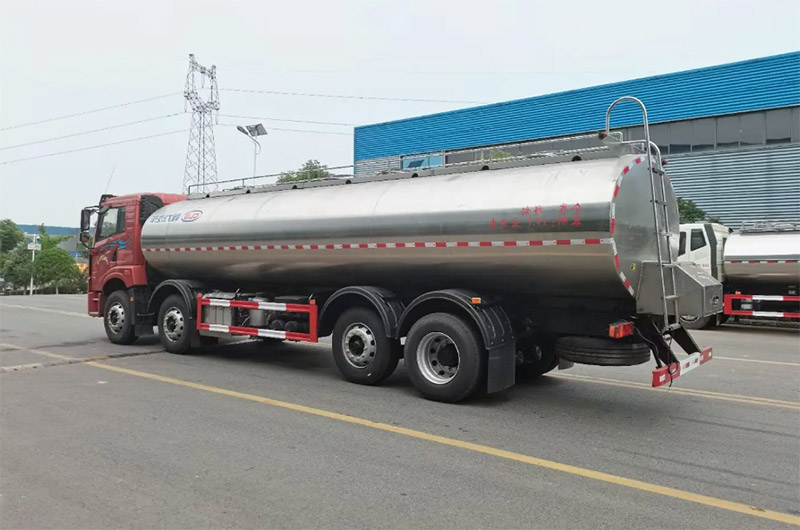
Aluminum Plate Surface Treatment
The surface treatment of the aluminum sheet can be polished (natural aluminum), anodized, or coated. When selecting a surface treatment, consider the desired appearance, corrosion resistance, and potential interaction with the cargo.
Width and Length
The width and length of the aluminum plate should be determined according to the size and design of the tanker body. Standard sheet sizes are generally available, but custom sizes can be obtained to meet specific requirements.
Be sure to consult with an industry professional such as the manufacturer, engineer, or regulatory agency to determine the specific aluminum sheet specification that meets your specific Tanker Body application requirements to ensure the selected specification is suitable for your needs.
Typical Aluminum Plate for Tanker Body
Several aluminum alloys are commonly used in tank truck bodies, each with its specific properties and suitability for different environments. The following are some aluminum alloys commonly used in tanker body applications:
-
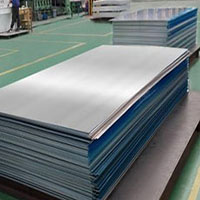 5052 Aluminum Plate for Tanker Body
5052 Aluminum Plate for Tanker BodyThis alloy has good corrosion resistance and formability. It is typically used on general purpose tanker bodies for transporting non-corrosive liquids such as water, milk, or food grade products.
-
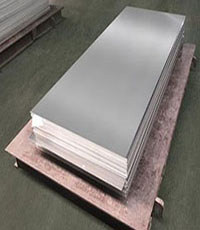 5083 Aluminum Plate for Tanker Body
5083 Aluminum Plate for Tanker BodyAlloy 5083 is highly regarded for its excellent corrosion resistance, high strength, and weldability. It is suitable for tanks transporting aggressive or corrosive liquids including chemicals, acids, and certain oils.
-
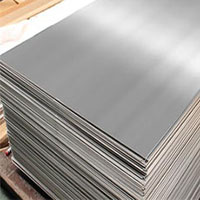 5086 Aluminum Plate for Tanker Body
5086 Aluminum Plate for Tanker BodyAlloy 5086 is similar to Alloy 5083 in terms of corrosion resistance and weldability. It is commonly used on tanker hulls transporting brine, brine, or other corrosive liquids, including marine applications.
-
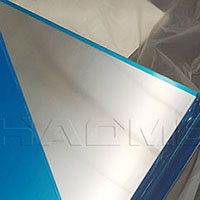 5454 Aluminum Plate for Tanker Body
5454 Aluminum Plate for Tanker BodyAlloy 5454 has excellent corrosion resistance and good strength. It is commonly used on tanker bodies for transporting non-corrosive and mildly corrosive liquids such as fuels, petroleum products, and water.
-
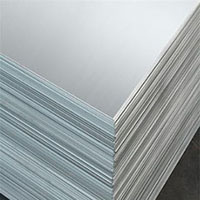 6061 Aluminum for Tanker Body
6061 Aluminum for Tanker BodyAlloy 6061 is known for its high strength and good corrosion resistance. It is commonly used on tanker bodies for transporting dry bulk materials such as cement, grain, or powder.
It is important to note that alloy selection depends on the Tanker Body's specific requirements, including cargo type, operating conditions, regulatory compliance, and budgetary considerations. Consultation with industry professionals and compliance with relevant regulations and standards are critical when selecting the appropriate alloy for a specific tanker body application.
Examples of applications of different alloys in tanker hulls include:
| Aluminum Alloy | Typical Applications |
|---|---|
| 5052 Aluminum Plate for Tanker Body | Water transport, food-grade liquids |
| 5083 Aluminum Plate for Tanker Body | Chemicals, acids, aggressive liquids |
| 5454 Aluminum Plate for Tanker Body | Fuel, petroleum product transport |
| 5086 Aluminum Plate for Tanker Body | Marine applications, corrosive liquids |
| 6061 Aluminum Plate for Tanker Body | Dry bulk materials, such as cement |
It is important to consult an industry expert, engineer, or manufacturer to determine the most suitable alloy for a particular tanker body application based on intended use, cargo requirements, and regulatory compliance.
How to Choose Aluminum Plate for Tanker Body
-
Material Selection
Aluminum alloys commonly used for Tanker Bodies include 5052, 5083, and 5454. The choice of these alloys depends on the substance that needs to be transported.
-
Thickness
The thickness of the aluminum plate will depend on the specific requirements of the tank car body, including size, weight, and intended use. Thicker sheets provide greater strength and durability, but add weight to the overall structure.
-
Corrosion Resistance
Tanker hulls are constantly in contact with a variety of corrosive substances, including liquids and chemicals. Choosing an aluminum alloy with high corrosion resistance, such as 5083 or 5454, will help ensure the service life of the tank car body.
-
Welding Issues
Welding is a key process in the manufacture of tanker hulls. Welding challenges may include achieving proper weld penetration, avoiding distortion, ensuring adequate strength and integrity, and minimizing the risk of defects or leaks.
-
Leakproof
Tanks must be leakproof to ensure safe transport of liquids or gases. Ensuring proper sealing, especially at welded joints and connections, is essential. Employ stress testing and quality control measures to identify and correct any potential leak points.
-
Structural Integrity
The Tanker Body must have sufficient structural integrity to withstand the loads, vibrations, and pressures encountered during transportation. Challenges can arise in maintaining structural integrity when manufacturing complex shapes, integrating reinforcements, and considering weight optimization.
-
Surface Coating
Applying the proper coating or finish to the tank body is important for corrosion resistance and durability. Challenges can include ensuring proper adhesion, achieving uniform coating thickness, and selecting coatings that are compatible with the cargo and operating conditions.
-
Compliance
Tanker Body complies with various regulations, standards, and certifications related to safety, structural integrity, leak prevention, and cargo handling.
Recommended content you might be interested in
-
5182 Aluminum Plate for Tanker
Specifically designed for tankers, our 5182 aluminum plate offers excellent corrosion resistance and high strength for reliable leak and splash protection.
-
5083 Aluminum Plate for Tanker
Our products meet the quality standards and complete specifications, choosing the right Tanker Aluminum Plate will not deteriorate or cause pollution in harsh environments.
-
5454 Aluminum Plate for Tankers
To ensure the safety and reliability of these tankers, the choice of materials is of utmost importance. Among the various materials available, 5454 aluminum plate has emerged as a popular choice due to its exceptional properties and benefits.
-
5754 Aluminum Plate for Tankers
5754 Aluminum Plate for Tankers Its light weight, corrosion resistance, durability and formability make it an ideal material for all types of tankers.
-
5059 Aluminum Plate for Tankers
The use of 5059 Tanker aluminum plates may become more widespread in tanker construction, contributing to a safer, more cost-effective and environmentally friendly transportation industry.
You might like the following content
-
5083 Aluminum Plate Sheet
5083 aluminum plate is a non-heat treatable alloy with high strength and corrosion resistance. We offer a wide range of sizes, thicknesses, and specifications at affordable prices to meet customer-specific needs.
-
5052 Aluminum Plate Sheet
5052 aluminum plate is mainly composed of magnesium and chromium. It has good processability, medium static strength, high fatigue strength, and good weldability. The fatigue strength of 5052 aluminum alloy is higher than most aluminum alloys.
-
5086 Aluminum Plate Sheet
5086 aluminum is not strengthened by heat treatment, but rather becomes stronger by strain hardening or cold machining of the material. 5086 aluminum sheet is commonly used in marine, cryogenic, pipeline, military, chemical and gas/oil/petroleum applications.
-
5182 Aluminum Plate Sheet
5182 aluminum plate, which is a deformed alloy with good corrosion resistance, good weldability, corrosion resistance, medium strength and cold working properties.
-
5454 Aluminum Plate Sheet
The strength of 5454 antirust aluminum is about 20% higher than that of 5052, and its characteristics are roughly the same as that of 5154, but its corrosion resistance is better than that of 5154 in severe environments.

